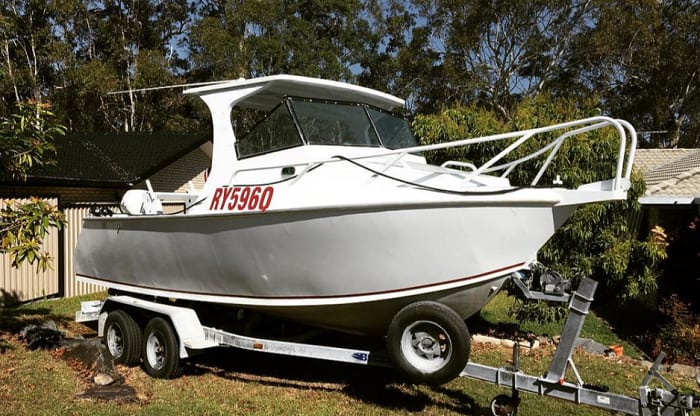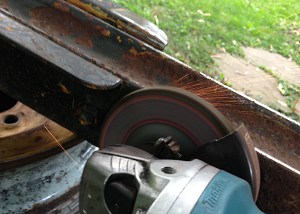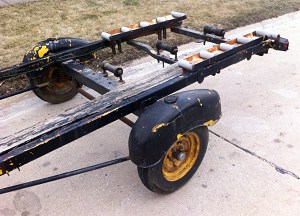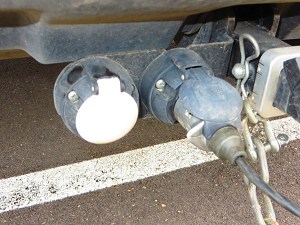If you think about it, boat trailers belong to a particular category of vehicles that endure the most batterings on every trip. They have to bear all that significant heft and have to deal with the corrosive effects of saltwater.
We haven’t even factored in the possibility of tire blowouts, banged-up axles, and burnt-out bearings. Now, do you see why, as a responsible boat owner, you should never overlook boat trailer maintenance?
This trailer maintenance checklist provides a few essential tips to help you avoid unnecessary headaches down the road.
Table of Contents
What Do You Need to Do and Look for?
1. Hose down your trailer every trip
Corrosion, as a result of consistent saltwater exposure, will slowly but surely eat up vital parts of your trailer. That fact alone dispels every excuse to not hose down a trailer after a dip in the ocean.
If you do not clean your trailer with a hose after every outing, you’ll most likely be looking at a rusty trailer in just a few years.
This takes care of the saltwater and, at the same time, dislodges unwanted debris like mud, dirt, sand, among others. Rinse every part, including the tires, rollers, runners, etc.
Remember, rusty rollers, tired tires, and broken brakes can be avoided if you clean your trailer after every fishing or sailing activity.
2. Always find the time to check every nook and cranny
The key to optimal trailer care is to take the time to do thorough inspections. By thorough, I mean you have to be willing to check the smaller components.
- Inspect the welds, bolts, and nuts for any signs of corrosion. If you see rust, immediately sand it with sandpaper, use a grinder, or apply rust-proof paint to prevent or slow down progression.
- You might see hairline cracks in the trailer’s leaf springs if that’s the suspension system you have. In most cases, this needs a closer inspection, so you better get down on your knees or lie on the ground to check.
Take Note: Any essential part like the rollers, leaf spring, and brakes that looks damaged need to be replaced as soon as possible to avoid accidents.
3. Make sure the tires are in good, working condition
Why am I placing special importance on tires? Well, based on statistics, tire-related issues are the most common cause of trailer breakdowns while on the road. Tell-tale signs to look out for are bulging sidewalls and cracking.
- Be mindful of the tread pattern that your tires make when you’re trailering. Any uneven pattern is worth taking note of, as that’s a sign of a bearing issue.
- Never forget to check air pressure, especially if you’re going on a long trip.
- If your trailer isn’t already using radial tires, consider swapping for them. I specifically encourage this to those who like to trailer for hundreds of miles.
- Another key factor in boat trailer tire maintenance is the brake pads. If they make any kind of noise similar to grinding, it’s probably because they’re making contact with something they shouldn’t. A replacement may be warranted if that’s the case.
4. Check your brakes often
A trailer’s brakes are one of its most crucial safety components. You can’t have any doubt in your mind if you’re hauling a trailer that’s got some weight to it on a dual-axle trailer and are relying on surge brakes.
In most shops, servicing wheel bearings also include servicing trailer brakes. It’s best to follow that habit as you perform your own maintenance.
- The ideal way to check whether surge brakes are still functioning is to hook then up to your towing vehicle and then back it up. The action should trigger the brakes, and it should be difficult to reverse the trailer if the brakes are in good condition.
- If the trailer has a reverse solenoid, be sure you don’t connect the wiring.
- Telling signs of worn-out brakes include a noticeable noise, especially when you press the pedal. The same goes for pedal depression and the caliper pulling to one side.
- If the spindle is bent, the entire axle may already need to be replaced. Most bent, broken, or loose brake parts are recommended to be replaced immediately.
- Use only the correct brake fluid for boat trailers. Take only the advice given by the manufacturer. You should also know the correct brake fluid you need to use for every refill.
- Inspect the wiring for signs of fraying. If you have drum brakes, they shouldn’t have any signs of serious wear.
5. Mind the bearings
Overheating bearings and other related issues cause frequent breakdowns on the road. This is why I highly suggest you only settle for high-quality bearings for your trailer.
Boat trailer bearing maintenance also requires having a keen eye and ear and being vigilant in detecting tell-tale signs.
- The wheel bearings should turn smoothly. Any squeaking, stiffness, or abnormal sounds shouldn’t be present with every turn.
- Wobbling bearings often need to be tightened. Obviously, they should be packed with grease before any trip. Keep them clean and well-sealed as much as possible.
- If you’re using traditional greased bearings, be sure to check their insides for any signs of leaking. This is often the cause of tires seizing up while on the road.
If you want to know how to go about your boat trailer wheel bearings maintenance, please take the time to watch the following video:
6. Ensure the axles and suspensions are in tip-top shape
These parts are just as prone to rust as other parts of the trailer. Superficial rust can be easily remedied by a good sanding.
What you should be on the lookout for are cracks and more prominent signs of damage. Like in most damaged trailer parts, this may be a signal for you to start considering replacing them.
7. Be wary of out-of-order trailer lights
Like the tires, brakes, and suspensions, your safety on the road also hinges a lot on the trailer lights you use. Pay close attention to anything amiss about them.
For instance, they may be flashing at the same time or are noticeably dimmer than usual. These are situations that are already out of the ordinary and should be addressed.
- The most common cause of trailer light problems is grounding. Check the connection between your towing vehicle and trailer; anything broken off should be noted and addressed before taking another trip.
- Take the time to clean any part and area of the connections that have become dirty. Use emery cloth or something similar.
- Check the wires inside the tubing of the trailer if the problems persist. A thorough cleaning of the grounds and terminals may take care of malfunctioning trailer lights.
Other Components Worth Checking Out
- Clean dirty connector plugs and check their wires for fraying.
- Trailer winches need to have sound and solid straps to avoid any accident while pulling your vessel onto the trailer.
When in Doubt, Don’t Hesitate to Let the Pros Help You
A boat trailer service should always be your last resort and first priority (assuming you don’t mind paying the hefty cost).
They know how to spot most issues, after all, and almost always have ready solutions to most problems. There’s no equaling the peace of mind you’ll get knowing that your trailer is being serviced by a knowledgeable and well-trained trailer mechanic.
I suggest you try searching for trailer maintenance near me to get a good idea of your local options.
Conclusion
Boat trailers deserve all the support and attention they need because they’re what determines whether your fishing trip will push through or not. Never overlook any seemingly minor issue they may have.
I hope this guide on boat trailer maintenance I’ve prepared has given you an idea of the best preventive steps to take going forward.
Did you find it helpful? If yes, you’ll do me a big favor if you share it with others who need it. Thank you and happy trailering and sailing!

“My intention from the first day establishing Boating Basics Online is to provide as much help as possible for boaters who want to experience a first safe and convenient trip. So feel free to join us and share your beautiful journeys to the sea!”




